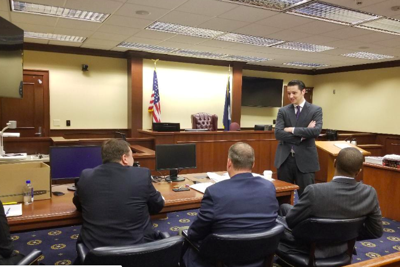COLUMBIA — In South Carolina, whistleblowers who want to file an ethics complaint against a public official are first sworn to secrecy.
They can’t talk about their allegations, no matter how egregious, until the State Ethics Commission has looked into the complaint and decided what to do with it. Breaking the seal of secrecy is a misdemeanor that carries a fine of $1,000 and up to a year in prison.
And if the state’s ethics police dismiss the complaint, even on a technicality? The whistleblower can never speak of it again.
Observers have long suspected the rules violate free-speech protections guaranteed in the U.S. Constitution. But now, a Columbia attorney is mounting a legal challenge to strike down the S.C. Ethics Act's gag orders for good.
Chris Kenney, who works in the law firm of state Sen. Dick Harpootlian, D-Columbia, has filed a federal lawsuit that asks a judge to declare that portion of the law unconstitutional.
Kenney filed the challenge on behalf of an unnamed plaintiff who can’t speak about a complaint he filed against a state lawmaker because the Ethics Commission dismissed it in a closed-door proceeding.
That’s a problem, Kenney wrote, because the ethics case exposes a serious loophole in South Carolina’s ethics law and his client wants to push the Legislature to address it.
Longtime state government watchdog John Crangle said Kenney’s lawsuit is “long overdue.”
Making ethics complaints against politicians public might be embarrassing for them, but it’s good public policy, said Crangle, who ran unsuccessfully for the S.C. House in 2018.
News of a complaint against a particular politician might embolden more whistleblowers to come forward against them, he said.
It also puts pressure on the Ethics Commission to thoroughly investigate those complaints before disposing of them, Crangle said.
“Right now, the commission can swallow the complaint and dismiss it without an extensive investigation,” he said.
Ethics Commission Executive Director Meghan Walker said she was aware of the lawsuit but declined to comment while it remains pending. Either way, her agency doesn’t write the state Ethics Act. State lawmakers do.
Kenney’s lawsuit is centered on an ethics complaint the commission dismissed on Aug. 3.
His client alleged that an unnamed state lawmaker improperly voted on a bill to benefit a special interest entity that had paid him some $108,000 over the course of three years. The lawsuit does not identify the special interest, and Kenney would not disclose its identity.
According to the lawsuit, Kenney’s client detailed a scheme in which the special interest laundered money to the lawmaker through several companies.
The complaint alleged a subsidiary of the special interest paid several contracts worth tens of thousands of dollars each to two limited liability corporations owned by the lawmaker.
The lawmaker then voted in favor of a bill that would benefit the special interest, instead of recusing himself and detailing the conflict of interest.
The lawsuit included few details hinting at the identity of the lawmaker, the special interest or the subsidiary. Kenney declined to comment, saying his lawsuit speaks for itself and the gag order prevents him from explaining more.
According to Kenney’s filing, the Ethics Commission dismissed the complaint in a secret ruling after deliberating behind closed doors.
Commissioners decided the lawmaker’s receipt of the money from a special interest’s subsidiary didn’t constitute an “affiliation” with the special interest itself, Kenney said.
In the lawsuit, Kenney described the finding as a “legal absurdity."
Elected officials are required by the Ethics Act to publicly disclose their sources of income and recuse themselves from voting or debating on proposals when a conflict of interest arises.
But by funneling the money through other companies, politicians and special interests can easily avoid disclosing those conflicts, Kenney warned.
Kenney wrote that his client wants to push the Legislature to close the loophole but can’t "without subjecting himself to criminal penalty" under South Carolina law.
"Plaintiff has good reason to want to speak," Kenney wrote.












